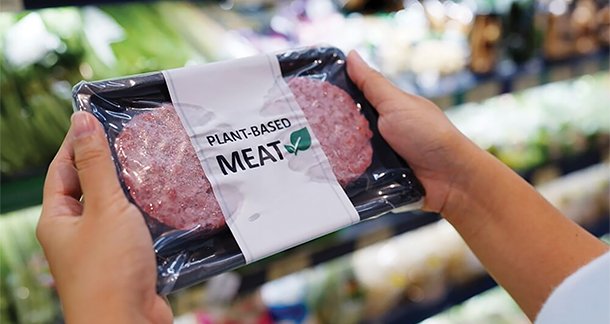As the world pivots toward more sustainable and health-conscious choices, the market for plant-based meats continues to grow. No longer a niche, plant-based foods have become an integral part of the modern consumer’s diet, driven by growing demand for healthier, environmentally friendly alternatives to animal-based proteins. From burgers to sausages and even chicken nuggets, plant-based substitutes are flooding the market, but there’s still a significant challenge to overcome: getting them to taste and feel like the real meat.
The global market for plant-based proteins is projected to rise exponentially, with experts predicting a multi-billion dollar industry by the next decade. However, despite the surge in popularity, plant-based meat alternatives often suffer from high prices due to the costly development processes and limited number of manufacturers. As a result, many consumers are unable to fully embrace these alternatives. This is where innovation, especially from startups, is creating pathways to make these products more affordable, accessible and crucially, delicious.

The Challenge of Texture and Mouthfeel in Plant-Based Meats
One of the major hurdle that plant-based meats face in terms of consumer adoption is the texture. When we think of meat, we think of juiciness, bite, and overall mouthfeel. A burger needs to sizzle on the grill and retain its moistness when cooked; a chicken nugget needs to have a crispy exterior and a tender inside. These textural elements are hard to replicate with plant-based ingredients.
However, startups are getting creative in developing solutions that bring plant-based meats closer to their animal-derived counterparts. The key lies in mimicking the texture and mouthfeel of meat using plant-based ingredients, which is no small feat.
JRS (J. Rettenmaier & Sohne), is making significant strides in this area by utilizing VITACEL® Plant based Dietary Fibers (E number free) & VIVAPUR® Methylcellulose (E 461) & Hydroxypropyl Methyl cellulose (E 464), which enhances texture and mouthfeel in vegan products.
Dietary Fibers are Clean – labelled, Gluten free ingredients originally sourced from plant matters with no side effects.
Dietary fibers in plant-based meat not only enhance freeze thaw stability, texture, and mouthfeel but also improve moisture retention, offering a juicy, fibrous & tender bite. These Dietary fibers supports emulsion, viscosity built up and form stability.
In addition dietary fibers contribute in reducing calorie density, enriching the dietary fiber content, making the product healthier & tastier.
Methylcellulose & Hydroxypropyl methyl cellulose are versatile ingredients that provides both adhesion and binding properties to vegan meat alternatives. Not only does it help with texture & mouthfeel, but due to its film forming ability it also reduces fat absorption during the frying process, improving the final product’s overall feel and quality.
Additionally, Methylcellulose provides form and fry stability, improves freeze/thaw stability, which is essential for mass production and distribution of plant-based meats.
For food manufacturers, Dietary Fibers (Clean labelled) , Methylcellulose & Hydroxypropyl Methylcellulose are proving to be a game changer, helping to bridge the gap between the expectations of meat-lovers and the realities of plant-based ingredients. The combination of binding, reducing fat absorption and enhancing texture makes this ingredient a crucial tool for scaling up plant-based meat alternatives that mimic the familiar tastes and textures of traditional meat products.
Why Plant-Based Foods Are More than Just a Trend
Investing in plant-based products is no longer just a matter of supporting a trendy, health-conscious movement. The shift toward plant-based diets represents a larger societal change rooted in environmental concerns, ethical considerations, and a desire for healthier food options.

Market Growth and Consumer Demand
The plant-based food sector is booming. Driven by younger, more health-conscious consumers, demand for plant-based options is at an all-time high. According to a recent study, nearly 40% of U.S. consumers identify as flexitarians, meaning they are open to eating plant-based foods at least some of the time. As awareness around the health risks associated with consuming red meat continues to rise, consumers are increasingly seeking alternatives that offer the same nutritional benefits without the associated health risks.
Moreover, the benefits of plant-based meats go beyond personal health. Plant-based diets are known to contribute to a reduction in the carbon footprint. With the impact of animal agriculture on climate change becoming more evident, plant-based foods offer a solution to mitigating the environmental impact of the food industry.
Sustainability and Ethical Considerations
The sustainability benefits of plant-based products are becoming increasingly apparent. By reducing reliance on animal agriculture, plant-based foods significantly lower greenhouse gas emissions, conserve water, and protect biodiversity. For example, it takes far less land and water to grow crops for plant-based proteins than it does to raise livestock. This makes the plant-based food sector an attractive proposition for eco-conscious consumers and investors alike.
For investors, this offers a chance to back a burgeoning industry with strong ethical foundations. With global concerns about environmental issues only intensifying, companies creating plant-based alternatives not only stand to benefit financially but are also positioned as leaders in an increasingly green economy.
Innovation and Financial Returns
The plant-based food industry is characterized by constant innovation. Companies are continuously researching and developing new products that are both more nutritionally beneficial and taste closer to traditional animal-based foods. From plant-based dairy products to protein-rich meat analogues, the possibilities are expanding, and so is the market.
For investors, the potential returns in the plant-based sector are substantial. As the demand for plant-based alternatives continues to grow, companies that are able to stay ahead of the curve with innovative products will reap the benefits. Additionally, investing in plant-based ingredients suppliers, offers opportunities to engage with the supply chain and ensure a broad base of options for future innovation.

Overcoming Taste and Texture Challenges: A Look Ahead
While the texture and flavor challenges of plant-based meats are being tackled, there’s still room for improvement. Startups and established players alike are working on perfecting flavor profiles, improving protein structures, and enhancing the sensory experience of eating plant-based meat.
The success of plant-based meat is reliant on its ability to offer the same—or better—taste, texture, and satisfaction as traditional meat. Dietary Fibers and similar ingredients offer vital solutions to these problems, ensuring that as more consumers turn to plant-based diets, the products will not only be more affordable but also more enjoyable.
Ultimately, the shift toward plant-based diets is more than a food trend. It’s a movement powered by innovation, sustainability, and the demand for healthier options. With companies like JRS leading the way with groundbreaking ingredients such as Dietary Fibers & Methylcellulose, plant-based meats are poised to become the norm on dinner tables around the world. The future of food is plant-based, and with continued research and innovation, we’re not just changing diets rather WE ARE CHANGING WORLD.
By Ms. Prachi Kale *



